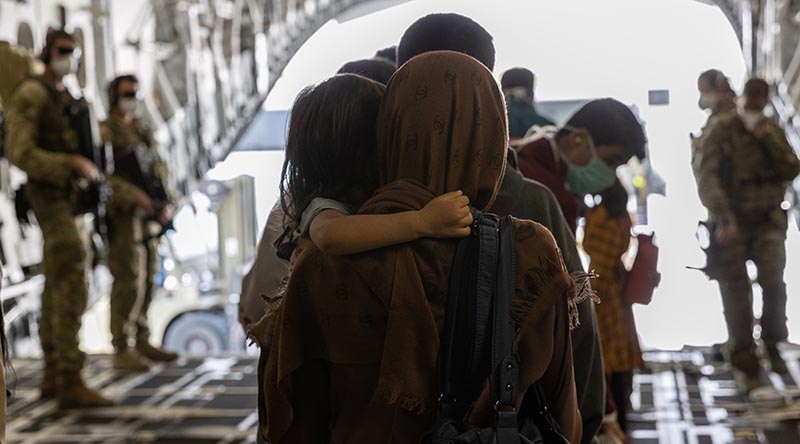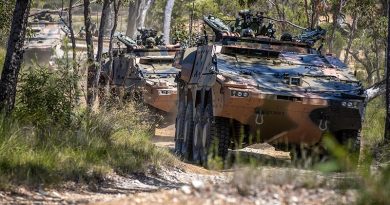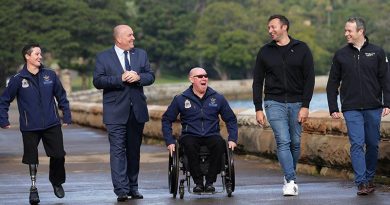Prime Minister admits fall of Afghanistan wasn’t a surprise
Share the post "Prime Minister admits fall of Afghanistan wasn’t a surprise"

Prime Minister Scott Morrison has revealed the fall of Afghanistan was not a surprise to his government – if only the speed of the fall.
CAPTION: Afghanistan evacuees arrive at Australia’s main operating base in the Middle East on 21 August, on board a Royal Australian Air Force C-17A Globemaster. Photo by Leading Aircraftwoman Jacqueline Forrester.
In an interview with David Speers on the ABC Insiders program today, Prime Minister Morrison admitted it wasn’t a surprise – “and that’s why we were taking the actions we were taking as far back as before April, to ensure that we were massively accelerating how we were getting people processed to get them out of the country”.
“So, when this hit, we weren’t sort of trying to get Australian diplomats out of there – we weren’t trying to get them and their families and their locally engaged employees out.”
Mr Morrison also revealed that a further four flights went into Kabul overnight evacuating more than 300 people.
TRANSCRIPT OF INSIDERS INTERVIEW:
David Speers: Prime Minister Scott Morrison, welcome to the program.
Prime Minister: Morning, David.
Speers: So, what’s the advice now for Australians who are stuck in Kabul, as well as those others you’re trying to evacuate? Should they head to the airport or not?
Prime Minister: Yes, and that’s the constant communication we’ve had – wherever we can have that communication – with people who are still there, in Kabul in particular. And, last night we ran four flights into Kabul and over 300 were able to be evacuated out of Kabul. We will continue to run those flights, working together with our partners and our allies. We are uplifting not just Australians and Afghan visa holders for Australia, but those from the United Kingdom, the United States and New Zealand and and those, the offer to work together with others, such as Japan, is all there. And, so, as best as we can communicate in what is a very chaotic environment, with comms under constant pressure and a very chaotic scene outside the airport, then we continue to make that communication and get as many people through as we possibly can in the time we have available, as safely as we can.
Speers: So, you managed to get four flights out overnight. Do you know how many Australians and indeed Afghans you’d like to evacuate, remain on the ground?
Prime Minister: Well, it is a very fluid situation, David. And the registrations that we have are often not first hand, and they need to be confirmed. So, what we’re simply doing right now is getting as many people out safely with the proper checks, with the proper checks being done both on the on the airfield itself, and as well as back in AMAB in the Emirates, to ensure that we’re we’re doing the right thing in terms of Australia’s national security interests, but also the right thing by humanitarian interests in supporting as as many of the efforts as we can, not just for Australian citizens. We are certainly getting Australians out and Afghan visa holders on their way to Australia, but we also doing the same for other countries, just as they have done for us.
Speers: To be clear, you’re saying the advice is still try and get to the airport, because Americans are being told, it’s too dangerous, stay where you are?
Prime Minister: Well, this, I can’t speak for the advice of others, but given the situation – which I’ve got to stress is terribly dangerous outside the airport – and there are enormous frustrations, all countries are experiencing that in trying to bring people through and get them through the gate, where we then support them and process them there within the airport compound, and then board them onto the flights. But, what is pleasing is I was concerned earlier in the week about how weather may have restricted those flights, but we’ve been able to get eight flights in and out now. Other countries are doing the same and we’re all working together. Our Charge d’Affaires on the ground there – Richard Rogers – is doing an extraordinary job in leading that effort on the ground, with many now there supporting that effort from the ADF, Home Affairs, and so on. And, they are great heroes of Australia at the moment. They are saving lives every single day.
Speers: Can you give any guarantee you will be able to get all Australians out who want to get out? That, Joe Biden’s given that sort of guarantee for American citizens.
Prime Minister: We will be doing everything we can in the time we have to get as many people out as safely as possible.
Speers: That’s not a guarantee you’ll even be able to get Australian citizens out.
Prime Minister: Well, David, I can’t guarantee the situation in Afghanistan. Australia is not in that situation. The United States are in a very different situation to Australia. We have to work in the environment as we, as we know it, and we have to do the best we possibly can …
Speers: [Interrupting] Well, this comes to …
Prime Minister: … That is why, David, for, that is why David, for many months now, for many, many months, we were able to get 430 Afghan nationals out of the country before the, this most recent situation arose. Now, that doesn’t happen overnight. As you know, it takes many, many months to process people, to have the security and health checks that we’ve brought out – over 14,500 Afghan nationals have been resettled in Australia by our Government. And, we’ve continued …
Speers: But, the criticism is it’s taken too long, all that processing, and now you’re scrambling, understandably, to to get them out, and obviously hurrying things up. Why couldn’t this have happened earlier?
Prime Minister: Well, there’s, well, it was happening earlier, David. As I said, we’ve got 1,800 Afghan locally engaged employees and their families out over the term of our Government, and 430 since April alone, particularly as we became aware of what was occurring. And, we obviously, on military advice, on Defence Force advice, moved in May to close down our embassy there. And, so, we have been getting them out, and faster than many other countries, I hasten to add. Over the last, over a four, five-year period, we were able to get out over 5,000 people. The United Kingdom was about 3,500. Our overall effort over these many years is around 14,500, as I said, and that compares to about 18,000 for the entire of the United States …
Speers: But, there still might be some, Prime Minister, who, there still might be some who you can’t get out?
Prime Minister: Well, it’s Afghanistan, David, it’s a war zone. It’s a failed state, and it has been, and we’ve been seeking for the last 20 years, for the last 20 years, to try …
Speers: [Interrupting] Well, let me ask you this. When you shut, when you shut the embassy and pulled out the troops, shut the embassy in May, did you expect Kabul would fall this quickly?
Prime Minister: Well, we were relying on the same advice that many others were. But, I must admit, we …
Speers: [Interrupting] What was that?
Prime Minister: … we treated that advice very cautiously about how much time was there, and that’s why we did …
Speers: [Interrupting] So, did you expect it to fall, or not, this quickly?
Prime Minister: … at the end of May. Well, eventually, of course, when the United States were ultimately going to leave, and let’s be clear – that process started some time ago …
Speers: [Interrupting] Sure. But, you didn’t expect it to fall this quickly, is the question?
Prime Minister: No, I, well, that was the advice to us from our partners and allies that that was not the pace at which it would occur …
Speers: [Interrupting] Bit of bad advice.
Prime Minister: Well, David, I mean, people can be very wise in hindsight, with these situations …
Speers: [Interrupting] With respect, 20 years of war, and we’ve been there fighting the Taliban, training and mentoring the Afghan National Army, and then what? It’s a surprise that suddenly the Taliban can take over so quickly?
Prime Minister: Well, I wouldn’t say it was a surprise, David, and that’s why we were taking the actions that we were taking as far back as before April, to ensure that we were massively accelerating how we were getting people processed to get them out of the country. And, that’s exactly what we’re doing, including our own people who were there. So, when this hit, we weren’t sort of trying to get Australian diplomats out of there. We weren’t trying to get them and their families and their locally engaged employees out …
Speers: [Interrupting] Well, you are now trying to get Australians out.
Prime Minister: … already acting on all of those things for some time.
Speers: You are now trying to get Australians out. It’s a very difficult and dangerous situation.
Prime Minister: Well, of course we are, these are people … Yeah, but, David, what I’m stressing is as, in terms of our diplomatic mission and those who are involved there, I mean, over the last couple of days, many countries have been getting their diplomatic staff out. That was not a challenge we had, and we could focus on getting Afghan nationals out, and many Australians who hadn’t even registered as even being in the country a month ago, let alone a week ago …
Speers: [Interrupting] Well, the US did begin evacuation operation more than a month ago called Operation Allies Refuge. Australia chose not to, back then.
Prime Minister: David, we’ve been getting people out for years, for years. Now, let me stress this about getting people out of Afghanistan. Over many years, as the situation has ebbed and flowed, there are people who have worked with us and people we’ve been bringing out may have worked with us five, six years ago. And, what they’ve been doing in that intervening period is an unknown. And, so, we also have to be exercising the appropriate caution, and that’s what we have been doing. But, Australia has had one of the most successful evacuation and repatriation program – not repatriation, but resettlement programs out of Afghanistan, for both Afghan nationals and those who’ve worked with us, of any country. Only Canada, on a per capita basis, would be higher than Australia. So, we’ve been getting that job done. But, David, let’s not kid ourselves. It’s a war zone. It’s a failed state. The Taliban have been an evil influence in that country for a very long time …
Speers: [Interrupting] Well, just on that. So, for 20, for 20 years, we’ve been told we need to be there in Afghanistan to protect our national security, as much as anything. Now, the Taliban is back. If they’re as evil as you say – I don’t think anyone seriously believes they’ve cut ties with Al-Qaeda or are suddenly going to give women equal rights – so, was the withdrawal of troops a mistake?
Prime Minister: Well, let’s talk about the history, given that’s the nature of the question. I mean, we originally went out there because Osama bin Laden wouldn’t be handed over by the Taliban and all those who were conspiring with him. And, as a result, the United States, supported by Australia and many other forces, went in there and took action to disrupt and dismantle Al-Qaeda’s base of operations in Afghanistan, and that was achieved. Once that had occurred, the nature of the mission then was, a vacuum had been created, and Australia, working with others, sought to make a failed state a functional state. And, for 20 years, Australians, Americans, the Brits and others were there trying to make that a success, over 20 years. At the same time, other countries in the region were supporting the Taliban, giving them safe harbour, allowing them to regroup and ultimately to counterattack against coalition forces in Afghanistan …
Speers: [Interrupting] Who was doing that?
Prime Minister: … You want to know why the things are occurring in Afghanistan, it’s because of the Taliban and those who have supported them.
Speers: Yeah, but the question still remains then, if that was the case, was the withdrawal a mistake?
Prime Minister: Well, David, after 20 years, the United States made a judgement, after 20 years of trying to make a failed state a functional state …
Speers: [Interrupting] What was your judgement? Did you disagree with that judgement? Did you at any point raise a concern with President Trump or President Biden?
Prime Minister: We’ve had numerous discussions about these issues over the years, not just myself, but my predecessors as well. Ultimately …
Speers: [Interrupting] So, did you disagree with the American decision?
Prime Minister: David, I’m not going to go into those discussions. What I am going to say …
Speers: [Interrupting] Don’t, don’t the Australians who served there, the Afghans as well, deserve to know. This is an important question, a critical question. Did you, as Australian Prime Minister, disagree with the American withdrawal?
Prime Minister: David, at the point of the withdrawal, let me take it back a step. Australia’s presence in Afghanistan is entirely conditional on the United States presence in Afghanistan …
Speers: [Interrupting] Yes, I understand that.
Prime Minister: … That’s just a realistic fact, which Australian troops …
Speers: [Interrupting] You have a unique position…
Prime Minister: [continues] …if you’d let me finish. If you’d let me finish … Yeah, of course, David, and over a long period of time all prime ministers have had that discussion, going as far back as John Howard, about the operations that we’ve had there, as have our military planners and our military officials in terms of the success of our operations in Afghanistan. At the end of the day, ultimately, a decision was taken, going back as far as the Obama Administration, followed up by the Trump Administration in February of last year when they were talking to the Taliban. And, that has been followed through by the Biden Administration. And, as a result, Australia has to take its decisions based on the environment which were there. But, let me say this. For 20 years, we have all worked hard to try, in the best of our efforts and endeavours, to make a failed state a functional state, and as the Taliban …
Speers: [Interrupting] I understand that, Prime Minister … I’m sorry to keep asking this question.
Prime Minister: And, David, if you’d let me finish. Please, David, no, I’m sorry, David, if you’d let me finish.
Speers: … Whether you agreed or disagreed with …
Prime Minister: I’m sorry, David. I’m going to insist on finishing my answer. At the end of the day, what we’ve achieved in Afghanistan was trying to give that country a go at being a success. Now, sadly, at the end of the day, as the Taliban forces rolled in, it was very clear that that state was not able to defend itself. And, the question there goes, how long do the coalition forces remain in a place where you’ve sought to make it a success over 20 years? How many American, Australian and other lives are going to be committed to that end? Australia, the United States, so many of us – we have many interests around the world, and we have to keep Australians safe as well, and that’s what we’ve been working to do. But, I’d say this to all the veterans. As John Howard has said, there is no hierarchy of sacrifice for our Australian soldiers. Wherever they have fallen, they have fallen under our flag in our name, defending our values. And, in every single case, they have died in a good cause, and that is Australia’s cause and the values we stand for.
.
.

.
.
Share the post "Prime Minister admits fall of Afghanistan wasn’t a surprise"





